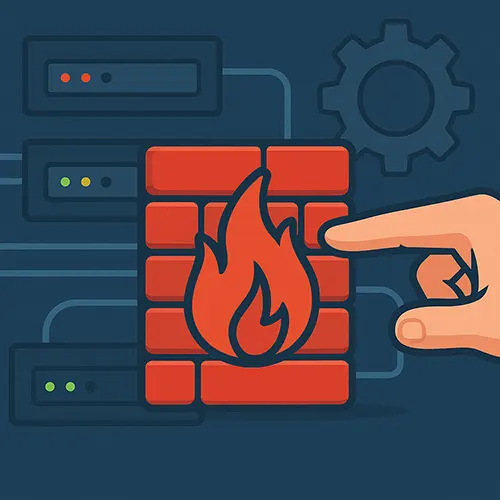How does a firewall protect your network?
A firewall is a security device that protects your network by monitoring incoming and outgoing network traffic. It examines each packet of data and blocks any that do not meet the specified security criteria, such as those associated with known malware or hackers.
Small business challenges and the importance of firewalls
Small businesses face a wide range of challenges, with cybersecurity being one of the most significant. The use of a firewall is a fundamental solution to address these challenges and protect valuable business data.
Why do small businesses need firewalls?
High volume of cyberattacks:
Targeted attacks: Small businesses can be the targets of specific attacks, especially if they have sensitive customer or financial information.
General attacks: These businesses are often exposed to general attacks such as malware, viruses, and DDoS attacks.
Limited resources:
Budget: Small businesses typically have limited budgets for cybersecurity.
Manpower: They may not have enough cybersecurity experts.
Lack of awareness of threats:
Employee unawareness: Employees may not be aware of cybersecurity threats and how to combat them.
Lack of updates: Systems and software may not be updated and are therefore vulnerable.
Importance of data:
Customer information: Customer data is one of the most valuable assets of a business and must be well protected.
Financial information: Business financial information is also very sensitive and if stolen, it can cause serious damage to the business.
What is a Small Business Firewall and How Does it Work?
A small business firewall is a security device specifically designed to protect the network of a small business from cyber threats. It acts as a digital gatekeeper, monitoring and controlling network traffic to prevent unauthorized access and malicious attacks.
How does a small business firewall work?
1. Network Traffic Monitoring : A firewall continuously monitors all incoming and outgoing network traffic, inspecting each data packet for potential threats.
2. Threat Detection: The firewall uses predefined security rules and advanced algorithms to identify suspicious activity, such as unauthorized access attempts, malware, and viruses.
3. Traffic Filtering: Based on the detected threats, the firewall applies appropriate filtering rules to block or allow network traffic. For example, it may block incoming traffic from known malicious IP addresses or deny access to certain websites.
4. Logging and Reporting: The firewall logs all network activity, including blocked and allowed traffic. This log can be used for troubleshooting, auditing, and identifying potential security breaches
Key Features firewall for small business:
Firewall Rules: Customizable rules that define which traffic is allowed or blocked based on factors such as IP addresses, ports, and protocols.
Intrusion Detection and Prevention (IDS/IPS): Detects and blocks malicious attacks in real-time.
Virtual Private Network (VPN): Enables secure remote access to the business network.
Content Filtering: Blocks access to harmful or inappropriate websites.
Application Control: Restricts or allows specific applications to access the network.
Web Application Firewall (WAF): Protects web applications from attacks such as SQL injection and cross-site scripting.
Benefits of Using a Small Business Firewall:
Protects against cyber threats: Prevents unauthorized access, malware infections, and data breaches.
Enhances network security: Creates a barrier between the internal network and the external internet.
Complies with regulations: Helps businesses meet industry-specific compliance requirements.
Improves productivity: Reduces downtime and disruptions caused by security breaches.
Safeguards sensitive data: Protects customer information, financial data, and intellectual property.
Selecting the right firewall for small businesses
A guide to choosing a firewall for small businesses
Selecting the right firewall for a small business is a crucial step in safeguarding digital assets and infrastructure.
Here are some Key factors to consider when choosing a firewall for small businesses:
Security Needs:
Data Volume: The amount of data to be protected and the number of network users.
Threat Landscape: Identifying common threats in your industry and geographic location.
Compliance: Adhering to data protection regulations.
Firewall Features:
Packet Filtering: Ability to inspect and block suspicious traffic.
Intrusion Detection System (IDS): Capability to detect attacks and malicious activities.
Intrusion Prevention System (IPS): Ability to actively block attacks.
VPN: Option to create a virtual private network for secure remote access.
Web Filtering: Ability to filter content and block access to malicious websites.
Reporting: Providing detailed reports on network activities and security events.
Ease of Use and Management:
User Interface: A simple and intuitive interface for management and configuration.
Central Management: Ability to manage multiple firewalls from a central console.
Cost:
Initial Purchase Cost: The cost of purchasing hardware and software.
Ongoing Costs: Maintenance, updates, and support costs.
Compatibility:
Operating System Compatibility: Compatibility with the operating systems used in the network.
Network Equipment Compatibility: Ability to work with other network equipment.
Support:
Technical Support: Access to technical support in case of issues.
Security Updates: Receiving regular security updates.
Best Firewall for Small Businesses
Choosing best small business firewall can be a daunting task, given the wide range of brands and features available.. Here are some of the most well-known and popular brands that are generally suitable for small businesses:
Top Firewall Brands for Small Businesses:
FortiGate:
Produced by Fortinet, FortiGate firewalls are highly regarded for their high performance, extensive features, and simple user interface. FortiGate firewalls offer a variety of security features such as IDS/IPS, VPN, web filtering, and threat management.
See All FortiGate distributed in UAE
See All FortiGate entry level Firewalls (Branch)
See All FortiGate Mid-Range firewalls (campus)
See All FortiGate High-End Firewalls (Data Center)
Palo Alto Networks:
Palo Alto Networks firewalls focus on application-based security and effectively protect small businesses from modern threats. These firewalls offer advanced features such as application-based intrusion prevention and machine learning.
Sophos firewalls:
combining robust security, ease of use, a wide range of features, and strong support, make them an ideal choice for businesses seeking to protect their networks and data
See All Sophos distributed in UAE
Cisco:
Cisco offers cloud-managed firewalls that provide simple management and high scalability for small businesses. Meraki firewalls are automatically configured and updated, allowing businesses to focus on their core activities.
SonicWall:
SonicWall firewalls offer a combination of hardware and software, providing strong security and high performance for small businesses. These firewalls offer a variety of features such as content filtering, VPN, and threat management.
WatchGuard:
WatchGuard firewalls focus on ease of use and management, making them ideal for small businesses. These firewalls offer a variety of security features such as web filtering, VPN, and threat management.
Recommendations:
Know what you need: Clearly understand your business’s specific security needs before making a choice.
Talk to the experts: Chat with different vendors to learn more about their firewall options.
Compare and contrast: Weigh the features, price, and what other users say about each product.
This list is merely a sample of popular brands, and other brands are available on the market. To select the best firewall, it is advisable to consult with a network security expert.






2 Responses
المقالة تشرح أهمية جدار الحماية للأعمال الصغيرة وكيف يمكن أن يحمي الشركات من التهديدات الأمنية الرقمية. يعتبر هذا الموضوع بالغ الأهمية في عصرنا الحالي حيث تتعرض الشركات الصغيرة لهجمات إلكترونية مستمرة. من خلال تبني حلول أمان فعالة، يمكن للمشاريع الصغيرة الحفاظ على بياناتها وحمايتها من المخاطر.
شكرًا جزيلاً على تعليقك القيم. نحن سعداء لأن المقالة كانت مفيدة في تسليط الضوء على أهمية جدار الحماية للشركات الصغيرة. كما ذكرت، فإن الشركات الصغيرة معرضة بشكل كبير للهجمات الإلكترونية، وبالتالي فإن تبني حلول أمان فعالة هو خطوة أساسية لحماية البيانات والأصول الرقمية. نأمل أن تكون المعلومات التي قدمناها قد ساعدتك في فهم كيف يمكن لجدار الحماية أن يساهم في تعزيز الأمان وحماية المشاريع الصغيرة. إذا كنت بحاجة إلى المزيد من التفاصيل أو الدعم، لا تتردد في التواصل معنا.